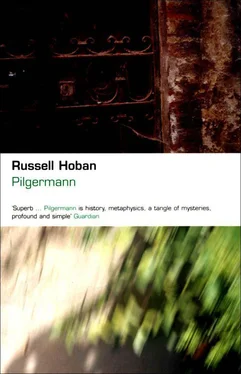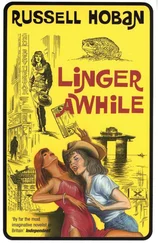Russell Hoban - Pilgermann
Здесь есть возможность читать онлайн «Russell Hoban - Pilgermann» весь текст электронной книги совершенно бесплатно (целиком полную версию без сокращений). В некоторых случаях можно слушать аудио, скачать через торрент в формате fb2 и присутствует краткое содержание. Год выпуска: 2002, Издательство: Bloomsbury Publishing PLC, Жанр: Современная проза, на английском языке. Описание произведения, (предисловие) а так же отзывы посетителей доступны на портале библиотеки ЛибКат.
- Название:Pilgermann
- Автор:
- Издательство:Bloomsbury Publishing PLC
- Жанр:
- Год:2002
- ISBN:нет данных
- Рейтинг книги:5 / 5. Голосов: 1
-
Избранное:Добавить в избранное
- Отзывы:
-
Ваша оценка:
- 100
- 1
- 2
- 3
- 4
- 5
Pilgermann: краткое содержание, описание и аннотация
Предлагаем к чтению аннотацию, описание, краткое содержание или предисловие (зависит от того, что написал сам автор книги «Pilgermann»). Если вы не нашли необходимую информацию о книге — напишите в комментариях, мы постараемся отыскать её.
Pilgermann — читать онлайн бесплатно полную книгу (весь текст) целиком
Ниже представлен текст книги, разбитый по страницам. Система сохранения места последней прочитанной страницы, позволяет с удобством читать онлайн бесплатно книгу «Pilgermann», без необходимости каждый раз заново искать на чём Вы остановились. Поставьте закладку, и сможете в любой момент перейти на страницу, на которой закончили чтение.
Интервал:
Закладка:
The bucket stood there stinking in a corner in a buzzing of flies in the dimness of the little locked stone room. I thought: Is this a metaphor? Then a nearby bird said, ‘Plink, plink, plink.’ Ah! I thought, explanations are unnecessary. So I felt a little better until the naked headless tax-collector appeared, writhing with maggots as always. Never mind, I thought, this is only illusion.
From wherever the tax-collector’s voice lived came a long sigh, ‘Ahhhhhhh!’ He assumed the necessary position over the bucket and emptied his bowels with a torrent like Onopniktes, I half expected dead donkeys to come out of him turning over and over in that disgusting flood. This is metaphorical illusion, I told myself, dismiss it from your mind; have other illusions, better ones; see Sophia. But Sophia would not come, even Bodwild would not come. My young death, I thought, surely he will come, I am like a father to him, I am his father — let us at least have a proper leavetaking before he goes out into the world to seek his fortune, let there be a fond embrace, a manly clasping of hands, a tear or two would be nothing to be ashamed of. But no, he would not come. Comfortless I sat on the floor with my elbows on my knees and my head in my hands.
‘Ahhhhhh!’ sighed the tax-collector again. He must have left the bucket because now he was returning to it to relieve himself once more with the same torrential rush and with a noise that was like the bursting of the Unseen into the seen, which of course in its own way it was. Surely, I thought, this is no proper epiphany; surely if God is gone I shall at least see Christ one more time, I deserve at least that much.
Pffffffttttt! went the tax-collector. The stench was no longer within the limits of what could be called a smell, it had become something in the nature of a metaphysical premise. The grotesquerie of the tax-collector’s appearing without a head while thus emptying himself of the waste of a lifetime, perhaps of more than one lifetime! Really, I thought, how much can be expected of my forbearance, my civility? After all, if this is illusion I must have something to say about it. ‘If you’re going to keep doing that at least you must accept responsibility for it!’ I shouted. ‘At least you can show your face!’
‘What did you say?’ said Bembel Rudzuk.
‘Say!’ I said. ‘Who can say anything with this constant noise, this unbearable stench!’
‘I don’t hear anything,’ said Bembel Rudzuk, ‘and I haven’t been noticing the smell for a while.’
‘Everything’s all right with you then, is it?’ I said. ‘With you there’s nothing to complain of?’
‘I’ve already told you,’ he said, ‘that I’ve had a good life and I’ve had enough of it and I’m ready to go. Why should I have any complaints?’
‘This smell,’ I said, ‘this smell isn’t illusion, it’s a real stink, it’s a stench of actuality.’
‘Where I am there’s not that much of a stench,’ he said.
‘There’s no need to be insulting,’ I said.
‘Don’t be ridiculous,’ he said. ‘Here we have an opportunity for preparation, we have a little quiet time in which there is nothing for us to do, nothing is required of us; it is like a silent desert in which we are not far from the track that will take us to that farthest lote-tree that is shrouded in unutterable mystery. All we need is a little patience, a little quietness of mind as we look for the track in the silent desert.’
‘You!’ I said. ‘You are attached to nothing, you care for no one.’
‘The one doesn’t necessarily follow from the other,’ he said. ‘I am attached to nothing but I care for you and I have cared for others in my time.’
‘Always you make me ashamed,’ I said.
‘Stop disquieting yourself and stop being ashamed,’ he said. ‘Use this time to find the track in the desert.’
‘Ahhhhhhhh!’ said the tax-collector returning to the bucket.
It seems now to be much later although I don’t know how much time has passed, I don’t know whether I’ve been asleep or not. The little stone room is full of darkness, but it seems to me that beyond the stench of the bucket I can smell the dawn that is coming. There enters my mind the thought that the bucket in the corner has been put there for Elijah. I don’t want Elijah to come here and relieve himself in that bucket, I want to see Elijah running ahead of Ahab’s chariot, running beautifully under a black sky in the rain and the wind, running in the thought of God to Jezreel.
Something is happening below us on the wall, there are footsteps and voices, there are armed men running, men shouting, ‘Deus le volt!’ The Franks are in Antioch and we are locked up in this little room of stone.
Bembel Rudzuk, whose silent stillness in the darkness suggests not sleep but contemplation, now says, ‘If you stand on my shoulders you can empty that bucket out of the window.’
This bucket-emptying is not a simple thing; there is no chair or table that I can use as a mounting platform, and one hand is of course required for the bucket. But Bembel Rudzuk at sixty-two is still a strong man. Facing the wall he kneels on one knee below the window. I step on to his broad shoulders and with one hand touching the wall I maintain my balance as he rises to his feet.
Bembel Rudzuk bracing himself with his hands against the wall is as steady as a rock. I am just high enough so that I can see the little crescent of the new moon of Tammuz and feel the freshness of the night on my eyes. From the sounds I hear I judge that our window overlooks the walkway on the top of the wall, and it is from this walkway that the shouts of the Franks are coming. There are cries and groans from the Turks; someone exclaims, clearly and distinctly as if required by history to bear audible witness, ‘We are betrayed!’
‘Bohemond!’ goes up the shout, ‘Bohemond! Bohemond! Bohemond!’
With my right hand under the bucket I slide it very slowly, very carefully up the wall to the window, keeping my balance with my face against the wall while I bring my left hand over to grasp the handle. There is in my mind an ardent prayer as I bring the bucket up over the window sill.
‘Deus le volt!’ I shout as I empty the bucket and hurl it after its contents. From below there comes a wild cry of rage as startling and primitive as the roar of a lion.
‘Allah The Finder,’ says Bembel Rudzuk.
At that moment the door opens and in the candlelight from a sconce on the stairs we see Firouz. He lays our bags and weapons on the floor. ‘Forgive me if you can,’ he says. In the doorway is my young death also, his face shining with love as he points to my sword that used to belong to Firouz. Bembel Rudzuk and I as one man stretch out our hands for our swords, we have no need of anything else now.
Pell-mell down the stairs we go to the walkway on the wall; there are dead Turks there, we step over them, we hurry down the next stairs to the ground.
‘Hidden Lion!’ says Bembel Rudzuk. Yes, yes, I know what is in his mind as we run. The little crescent hangs in the sky so delicate and slender, shouts and screams run through the darkness like fire through stubble; the mu’addhin will not sound the call to prayer in the new morning, there will be a great silence where there used to be the prayer of many. Stronger grows the smell of the dawn that is coming, that alchemy by which substance of darkness becomes substance of light in which are bodied forth all forms moving and still; the disquietude of the invaded houses, domes, and minarets, the continual surprise of Silpius that waits to manifest itself tawny and empurpled, unsurprised at the heaped bodies of the dead, surprised only that there should be world at all and itself in the world.
Читать дальшеИнтервал:
Закладка:
Похожие книги на «Pilgermann»
Представляем Вашему вниманию похожие книги на «Pilgermann» списком для выбора. Мы отобрали схожую по названию и смыслу литературу в надежде предоставить читателям больше вариантов отыскать новые, интересные, ещё непрочитанные произведения.
Обсуждение, отзывы о книге «Pilgermann» и просто собственные мнения читателей. Оставьте ваши комментарии, напишите, что Вы думаете о произведении, его смысле или главных героях. Укажите что конкретно понравилось, а что нет, и почему Вы так считаете.












